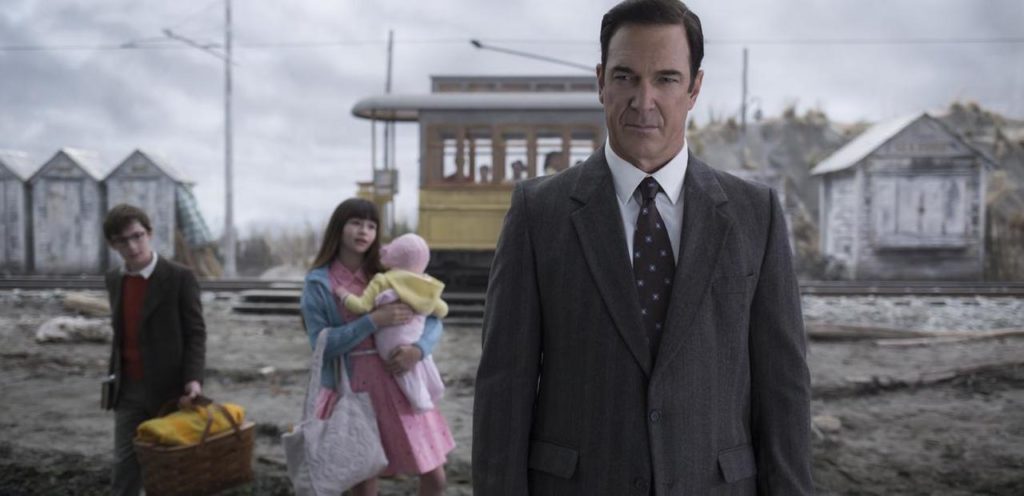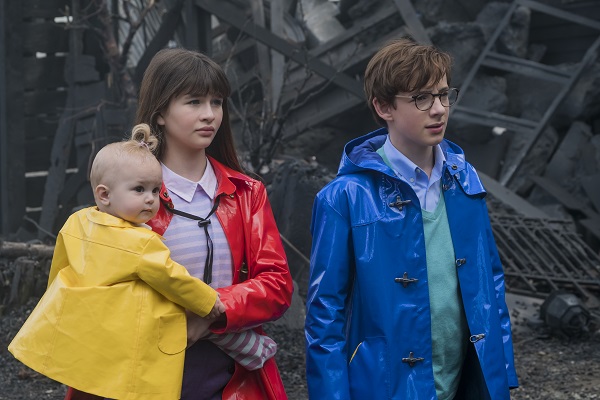Look Away: A Series Of Unfortunate Events
Houses burning down. Parents dying. Guardians dying. Untalented actors with ropes, knives, and nefarious plots. Hurricanes, deadly leeches, dangerous reptiles. Lumber mills with numerous safety violations. This is a series of unfortunate events, and you can pull up a chair and watch.
Or you could just look away.
This January Netflix premiered Lemony Snicket’s A Series of Unfortunate Events, an adaptation of the children’s series of the same name. To date, eight episodes have been aired, adapting four of the thirteen books. Like the books before it, the show revolves around the adventures, misadventures, and misfortunes of the three Baudelaire children. After their parents die in a mysterious fire, they must escape Count Olaf’s schemes to get a hold of them and the Baudelaire fortune – again, and again, and again.
I had heard of Lemony Snicket before, invoked as an example of the literary devices of lampshading and of breaking the fourth wall. Knowing only this, and absolutely nothing of the actual story, I tuned into A Series of Unfortunate Events. The two most prominent elements of this series are its tone and its humor. The tone is ostentatiously bleak, with the theme song warning that watching will ruin “your evening, your home life, and your day,” and narrator Lemony Snicket promising endless woe, troubles, and inconvenience. A literal pall hangs over the show – much of it, especially the scenery, appears to have been put through a gray filter. And this grayness is a mistake, an overreach of cleverness that undercuts the specific pleasure of a visual medium.

The series’ showily dismal tone is part and parcel with its humor – sometimes dark, always absurdist. A Series of Unfortunate Events thrives on repetition (it’s not a sea, it’s a large lake); on smashing the fourth wall (Lemony Snicket explains the concept of dramatic irony in relation to a particularly unfortunate event); on the unnecessary definition of words (in this context, “unnecessary” means “not needed”); on repetition (it’s not a sea, it’s a large lake); on absurdity (your closest living relative is the relative who lives closest to you); on repetition (LARGE LAKE).
As a rule, humor should not be explained or defended. If you don’t like this sort of humor, you won’t like the show. Even if you do, the show sometimes goes too far. It’s funny that Lemony Snicket has a two hundred-page book written by the woman he loves, explaining why she can’t marry him, but the repeated jokes about an older woman’s unfulfilled desires for marriage and a family are merely sad.
The characters of A Series of Unfortunate Events, like its humor, lean toward the absurd. Even Count Olaf, the villain of the story, is ridiculous, though he is sinister, too. The Baudelaires themselves are loyal to each other, courageous when the moment demands it, and – considering what they have to put up with – remarkably polite. They can be stilted at times, but in the natural sort of way you might expect wealthy prodigies to be stilted, and there’s something charming about them.
There’s a story here, too, but not much of one. I can usually enjoy the repetitivity of the humor, and always forgive it, but the repetitivity of the plot is another matter. Virtually every adult is malicious, dense, or both, and this allows the series to spin pointlessly through several reiterations of the same storyline. Villain employs laughable stratagem to get the children. Clueless adult falls for it. Children avert total disaster at the last minute. Villain employs laughable stratagem to get the children. Clueless adult falls for it. Children avert total disaster at the last minute. Stop me if you’ve heard this one. Villain employs …

The last episode suggests that the series may be breaking out of this cycle. I worry, however, that it will be crippled by a more fundamental flaw. You see, A Series of Unfortunate Events lacks heart. Sometimes it lapses into genuine drama, with ensuing moments of pathos, and there is poignancy in how fast the siblings hold on to each other. But all this seems almost beside the point – and in truth, if the show took Olaf and his schemes any more seriously than it does, it would be too dark. A disconnect exists in this series, and there’s no heart strong enough to unite it in meaning and emotion.
Despite this lack, A Series of Unfortunate Events has its virtues. It can be visually interesting, in spite of the overabundance of grey. It is sometimes fun, often delightfully absurd, and on rare occasions, moving. The cleverness and the humor are abundant, and who knows? We are only eight episodes in; the best may yet be ahead.








































I kind of liked this tv series, though as someone that tends to prefer more serious stories, I do wish this show would have taken itself a bit more seriously instead of being needlessly cheesy. They could have kept the humor and the overall feel the book series had even while being serious. And being a little more serious wouldn’t have necessarily kept it from being child friendly.
I’ve only read two or three of the books, but even with the absurd aspects to it, they seem far more serious than this tv series was.
I think an interesting yet sad aspect of this series is that it kind of reflects how some people feel about the justice/government systems and actions of people around them when it comes to abusive situations. There are many people who are in abusive situations, and can even produce evidence of the abuse, and are often ignored or gaslit. There are also other times when someone recognizes their plight and tries to help them, but may not be able to do much. Someone in that situation may find A Series Of Unfortunate Events comforting because they may think ‘If the Baudelaires can face this situation bravely, then so can I.’ And they feel less alone.
I found the same issues with the series. It tossed what could have been a powerful story in favor of cheeky gimmicks (I preferred the movie with Jim Carey to the netflix series). Though I have to admit, I laughed at quite a lot of the wordplay and repetitive, over-the-top humor. Some of the plot devices were a bit abusive toward the viewer, as well. . . such as the final reveal of the side plot with the mother and father we see trying to break out and get home to their children. I won’t spoil anything here, but when the reveal happened, I pretty much wanted to end watching for all of eternity.